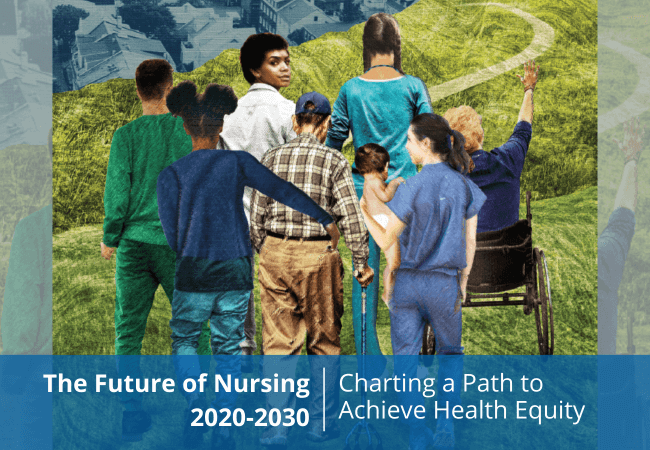
In Dark Times, NAM Study Sees a Bright Future for Nursing
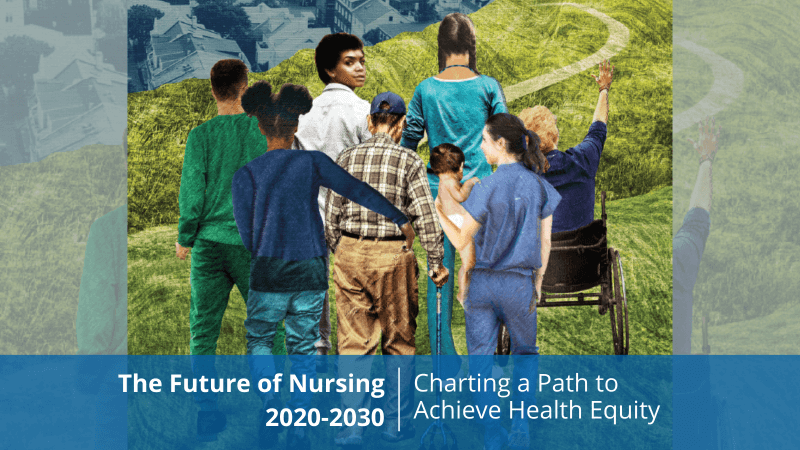
Earlier today, the National Academy of Medicine (NAM) released its eagerly awaited report, The Future of Nursing 2020-2030: Charting a Path to Achieve Health Equity. The report’s dedication to “nurses around the world who paid the ultimate price of caring for people during the COVID-19 crisis” strikes an appropriately solemn note given what has transpired, but the report itself lays out an optimistic and ambitious vision of the future. The authors see nurses taking on “expanded roles…in new settings in innovative ways” and contributing to ushering in “a new era of promoting health equity and well-being for all.”
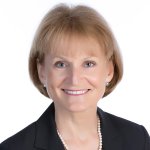
Mary Wakefield, PhD, RN, FAAN,
Funded by the Robert Wood Johnson Foundation (RWJF), the report examines nurses’ role in achieving health equity—the ability of everyone to attain their full health potential—and in bridging the health and social needs of individuals, families, and communities. “This is a transformational time for the field of nursing,” said Mary Wakefield, PhD, RN, FAAN, visiting professor at Georgetown University and the University of Texas at Austin, who co-chaired the NAM study committee that wrote the report. “Policymakers and health system leaders must seize this moment to strengthen nurse education and training, integrate health equity into nursing practice, and protect nurses’ physical, emotional, and mental well-being, so they can provide the best care possible.”
All of us at the Future of Nursing: Campaign for Action, an initiative of AARP Foundation, AARP, and RWJF, will be delving more deeply into the report in the coming weeks, and I encourage you to take a look for yourself. For now, here are a few key take-aways:
Diversity, Inclusion, and Equity
Nursing is an overwhelmingly white and female profession. To be effective in promoting health equity, nurses need to diversify their ranks. Whether in schools or the workplace, identifying, recruiting, and supporting nurses who reflect the diversity of the U.S. population and enabling them to take on leadership roles is critical to advancing equity. The report emphasizes the need to build partnerships with colleges that serve communities underrepresented in the nursing profession. I’m pleased to note that the Campaign is already engaged in this work, and we know we have more work to do. Noting the disproportionate impact of COVID-19 on communities of color, the report also includes a detailed discussion of racism as a social determinant of health and calls on nurses to acknowledge and dismantle racist structures within the profession.
Education
The report calls on education programs to prepare nurses to advance health equity. Historically, nursing education programs have focused heavily on preparing nurses to work in hospitals. That’s not sufficient if we want nurses to address social determinants of health, among them access to stable housing and adequate food, income, and education. Nursing schools will need to increase community-based learning experiences such as those captured by the Campaign in a 2018 survey of nursing educators. The report also urges schools to teach students to use telehealth and analyze data, skills that can assist them in addressing population health.
Nurses’ Health and Well-Being
The report calls on a range of stakeholders to immediately initiate efforts to promote nurses’ health and well-being, to address current concerns and prepare for future natural disasters and public health emergencies. The COVID-19 pandemic has left nurses feeling burnt out and unprotected as a result of their experiences in the workplace and incidents of hate and discrimination, particularly against nurses of Asian descent. Nurse leaders and employers have central roles to play in creating healthier work environments and policies that support nurses, but individual nurses, their associations, and policymakers can take steps to promote nurses’ health and well-being as well. The report also notes the potential for increased strain when nurses take on the emotionally taxing work of addressing health inequities and social justice issues, with the burden falling most heavily on nurses from underrepresented groups.
Paying for Nursing
The report stresses the need to reform the ways government and private insurers pay for nursing care so that nurses can devote more attention to disease prevention and other public and community health activities. The report gives a special shout-out to school nurses for the vital role they play in serving children with complex health and social needs. The study’s authors call on state and local governments to identify dedicated funding to ensure all children have access to a nurse while in school, which is sadly far from the case today.
Consonant with its sister report, 2010’s The Future of Nursing: Leading Change, Advancing Health, this new report also calls for more nurses to earn PhDs, for all nurses to lead in developing policy, and for the removal of barriers that prevent nurses from practicing to the full extent of their education and training. Not surprisingly, the report also urges the Centers for Disease Control and Prevention and other government entities to take a number of concrete steps to reinforce nurses’ ability to respond to future public health emergencies.

Lisa Marsh Ryerson
Among the other challenges that nurses will face in the next decade, the report notes the care needs of the nation’s aging population. As director of AARP’s Public Policy Institute, these words resonated strongly with me and my colleague Lisa Marsh Ryerson, president of AARP Foundation. “AARP and AARP Foundation began investing in nursing back in 2007 because we knew nurses were essential to advancing health for all Americans. That’s still the case, as the NAM report makes clear, and not just at the bedside,” Ryerson said. “Nurses are powerful allies in AARP’s effort to advocate for vulnerable older populations and communities.”
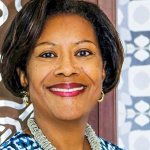
Edna Kane Williams
Edna Kane Williams, AARP executive vice president and chief diversity officer, also enthusiastically reviewed the report. “The pandemic revealed and exacerbated a range of disparities and injustices for people of color and for older Americans. All people—regardless of age, race, or income—should have access to affordable, patient-centered, quality care,” said Williams. “The NAM report affirms AARP’s work to diversify the nursing workforce, move towards health equity, and transform the health care system.”
I agree. As we review the report in the coming weeks, we’ll be posting more on its contents and what nurses can do to engage in the effort to advance health equity. I hope you’ll join us!
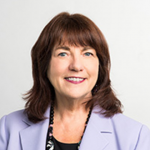
Reinhard is senior vice president and director of the AARP Public Policy Institute and chief strategist, Center to Champion Nursing in America, also an initiative of AARP Foundation, AARP and RWJF, which runs the Campaign for Action, and caregiving initiatives.
